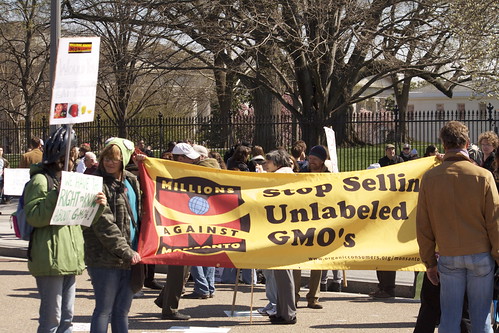Last summer, we described
how Americans were waking up to the fact of GM hidden in their food: in major cities across the USA 'guerilla theatre' was educating
shoppers and catching the attention of the media, while a rash of
state legislature was rolling out (see AWAKENING THE AMERICAN LION - June 2011).
There have been set-backs, but the
shift, once started, could only continue.
In March this year, over one million
people submitted comments to the US Food and Drug Administration
(FDA) on a petition for mandatory labelling of genetically engineered
foods. This was more than any other petition in FDA history.
By April, the news was spreading that numerous “natural” products whose identity of healthy, earthy, wholesome, junk-food alternative had been carefully nurtured, actually contain high levels of GM ingredients. The scandal focused particularly on 'Kashi', a cereal owned by Kellogg's.
In May, guerilla labelling inspred by
the 'Label It Yourself' movement (see below) was putting out stickers
informing customers: “Warning. May Contain GMO's
(Genetically Modified Organisms)”
Label It Yourself
The Label It
Yourself campaign is inspiring people to do exactly what their name
indicates, label GMO-containing foods themselves, drive-by style. The movement
describes itself as a “decentralized, autonomous grassroots
campaign born out of our broken food system”. It encourages people
to “autonomously label GMOs and empower other to do so, rescue
words like 'All Natural' and 'Natural Flavors' from being hijacked,
expose unfair labor practices.”
Then, in June,
things suddenly turned very serious on the labelling regulation
front.
US Congress has
seen sporadic, unsuccessful attempts to mandate GM food labelling
since 1999. A decade ago in Oregon, a GM labelling bill supported by
two-thirds of voters was defeated by a last-minute pro-GM PR spending
blitz. Since then 20 states have tried to establish GM labelling
laws, more than a dozen in the last year alone. Intense lobbying by
corporate vested interests have defeated most of these. And, if
persuasion failed, biotech industry threats to sue the State have
proved very effective.
In California, several labelling laws
have been drafted, but none has made it out of legislatuive
committee. But now something else has shifted the issue up a notch,
and put the State in the front line of what's clearly a national
fight between the people and industry.
Right-to-know campaigners in California
have petitioned the State with enough support to put GM-labelling
legislation on the ballot. For the first time, voters and
not politicians will be the ones to decide.
The bill, will be
on the November ballot. If passed, the law will require that all
foods containing genetically engineered ingredients be labelled
“Partially Produced with Genetic Engineering” or “May be
Partially Produced with Genetic Engineering”. Like the first
European laws on GM, labelling, alcohol, restaurant food, and produce
from animals fed GM are exempted.
The financial
stakes for this vote are huge. California is not just America's
leading agricultural state, but the most populous state in the
nation. If companies are made to change their labels in California,
they may well do so all over the country, rather than maintain a
costly two-tier packaging and distribution system.
Needless to say,
food companies and the biotech industry are expected to throw tens if
not hundreds of millions of dollars into the PR to persuade
Californians that labelling is unnecessary, that their farmers will
suffer, that their food will become more expensive, and probably that
it will even contribute to world hunger ...
Industry front
groups such as the 'Coalition Against the Costly Food Labeling
Proposition', the 'California Citizens Against Lawsuit Abuse' and
'Find Our Common Ground' have also popped out of the woodwork. If
these fail and labelling law is passed, the next stage will certainly
be a court challenge to the State's right to mandate its own
labelling requirements (a function usually reserved for the FDA at
federal level).
OUR COMMENT
The
food companies and biotech industry seem to have forgotten the most
important aspect of their business: consumer
TRUST
in the food system and in their products.
Given the strength of outrage and the State's reputation as a leader
of the pack, any industry trickery might actually make Californians
more determined than ever to get transparent labelling in their food.
And let's face it, with everything that's rumbling on in America, GM
labelling's going to happen later if not sooner no matter how much
PR, how many thousands of dollars, and how many court actions are
thrown at it.
What you can do
The Organic Consumers Association has raised a staggering $2 million
to support its California Right To Know GMO Labelling Campaign.
For starters, 'GMO Free USA' has called for a boycott of Kellogg's
products, because as it points out
“In this digital age, you have to wonder why a company would spend more money than it could possibly cost to change their product labels to fight against the consumers' right to know what we are eating”.The rational behind the boycott is sound:
“If a company like Kellogg's has to print a label stating that their famous corn flakes have been genetically engineered, it will be the kiss of death for their iconic brand in California - the eighth largest economy in the world - and everywhere else” (Harmon and Pollack)
You
can show solidarity for the American GM labelling cause by boycotting
Kellogg's yourself, but don't forget to tell
the
company what
you're
doing and why.
SOURCES
- Amy Harmon and Andrew Pollack, Battle Brewing Over Labeling of Genetically Modified Food, New York Times, 24.05.12
- California voters to decide on GMO labeling, www.carighttoknow.org, 12.06.12
- Senate rejects Sanders' food labeling amendment, Senator Bernie Sanders office, 21/06/12
- Elizabeth Mitchell, GMO Labeling Wars: Battlefield California, Media Bistro, 21.06.12
- Elizabeth Weise, Fight over genetically engineered crops on Calif. ballot, USA Today, 12.06.12


I think GMO labelling is very important and essential...
ReplyDelete